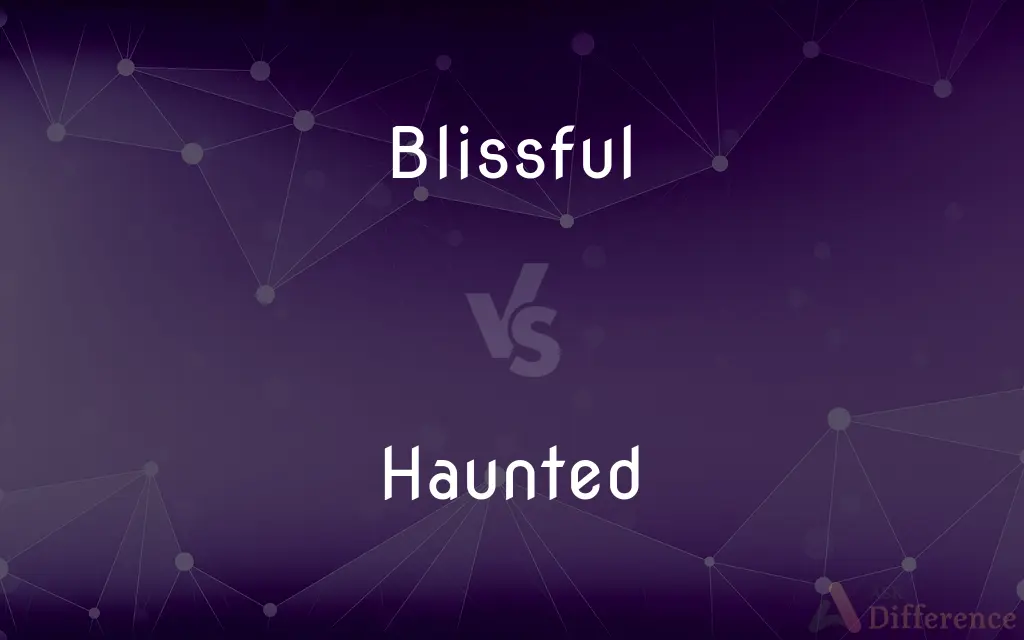Blissful vs. Haunted — What's the Difference?
By Tayyaba Rehman — Updated on December 24, 2023
Blissful means extremely happy or joyous, often implying a state of perfect contentment. Haunted refers to being frequented by a ghost or having a persistently disturbed or preoccupied mind.

Difference Between Blissful and Haunted
Table of Contents
ADVERTISEMENT
Key Differences
Blissful is associated with complete happiness and serenity, often used to describe idyllic situations or moments of great joy. Haunted, in contrast, implies a presence or influence that is disturbing, often linked to supernatural occurrences or a troubled state of mind.
In a blissful setting, one experiences a sense of peace and contentment, free from stress or worry. A haunted place or person, however, is overshadowed by a sense of unease, fear, or persistent troubling thoughts.
The term blissful is often used in positive, uplifting contexts, such as a blissful marriage or a blissful landscape. Haunted, on the other hand, finds its use in darker, more ominous contexts, like haunted houses or haunted memories.
Blissful can describe both fleeting moments and extended periods of joy and happiness. Haunted suggests a lingering, often unwanted presence or influence, whether it's a ghost or a troubling memory.
The essence of blissful is rooted in happiness and tranquility, while haunted evokes feelings of disturbance, fear, or preoccupation.
ADVERTISEMENT
Comparison Chart
Emotional Tone
Joyous and content
Disturbed and uneasy
Context of Use
Positive and uplifting situations
Dark, ominous, or troubled scenarios
Duration
Can be momentary or lasting
Often suggests a prolonged influence
Associations
Happiness, serenity, peace
Ghosts, fear, troubling thoughts
Connotation
Uplifting and serene
Ominous and disturbing
Compare with Definitions
Blissful
Experiencing great joy and contentment.
Their honeymoon was a blissful escape.
Haunted
Frequented by ghosts or spirits.
The old mansion was rumored to be haunted.
Blissful
Indicative of a state of perfect happiness.
The garden had a blissful atmosphere.
Haunted
Troubled by persistent thoughts or memories.
He was haunted by his past mistakes.
Blissful
Free from stress or worry.
The weekend at the spa was blissful.
Haunted
Continuously disturbed or worried.
Her eyes looked haunted after the news.
Blissful
Characterized by happiness and peace.
She had a blissful expression during the concert.
Haunted
Obsessed or preoccupied with something.
She was haunted by the idea of failure.
Blissful
Marked by a sense of joy and serenity.
The quiet morning was blissfully serene.
Haunted
To inhabit, visit, or appear to in the form of a ghost or other supernatural being.
Blissful
Extremely happy; full of joy
A blissful couple holding a baby
Haunted
To visit often; frequent
Haunted the movie theaters.
Blissful
Extreme happiness; ecstasy.
Haunted
To come to the mind of continually; obsess
A riddle that haunted me all morning.
Blissful
The ecstasy of salvation; spiritual joy.
Haunted
To be continually present in; pervade
The melancholy that haunts the composer's music.
Blissful
Extremely happy; full of joy; experiencing, indicating, causing, or characterized by bliss.
Haunted
To recur or visit often, especially as a ghost.
Blissful
(obsolete) Blessed; glorified.
Haunted
A place much frequented.
Blissful
Full of, characterized by, or causing, joy and felicity; happy in the highest degree.
Haunted
Also hant or ha'nt (hănt) or haint (hānt) Chiefly Southern US A ghost or other supernatural being.
Blissful
Completely happy and contented;
Blissful young lovers
In blissful ignorance
Haunted
Of a location, frequented by a ghost or ghosts. Category:en:Horror
The hotel was haunted by a disembodied spirit.
Haunted
Obsessed (by an idea, threat, etc.).
A soldier haunted by the memories of combat
Haunted
Showing a feeling of being disturbed.
A haunted expression
Haunted
Simple past tense and past participle of haunt
According to local legend, a ghost has haunted the mansion for two hundred years.
Haunted
Inhabited by, or subject to the visits of, apparitions; frequented by a ghost.
All houses wherein men have lived and diedAre haunted houses.
Haunted
Having or showing excessive or compulsive concern with something;
Became more and more haunted by the stupid riddle
Was absolutely obsessed with the girl
Got no help from his wife who was preoccupied with the children
He was taken up in worry for the old woman
Haunted
Showing emotional affliction or disquiet;
Her expression became progressively more haunted
Haunted
Inhabited by or as if by apparitions;
A haunted house
Haunted
Giving an impression of ominous presence.
The forest had a haunted, eerie feeling.
Common Curiosities
Can blissful describe a personality?
Yes, it can describe a consistently happy and content person.
Are blissful experiences always long-lasting?
They can be either momentary or extended.
Can haunted refer to a mental state?
Yes, it can describe a mind troubled by persistent thoughts.
Can a place be haunted in a non-supernatural way?
Yes, by memories or a sense of past events.
Does blissful imply perfection?
It often suggests an ideal state of happiness, but not necessarily perfection.
Is haunted always about ghosts?
No, it can also refer to being troubled by memories or thoughts.
Is blissful used in literature?
Yes, frequently to describe idyllic or joyous scenes.
Can haunted have a metaphorical meaning?
Yes, like being haunted by an idea or a feeling.
Can a moment be both blissful and haunted?
Typically no, as they represent opposite emotional states.
Is blissful a common term in everyday language?
Yes, it's commonly used to describe joyful experiences.
Does blissful have any negative connotations?
No, it's overwhelmingly positive.
Can someone feel haunted by positive memories?
Usually, haunted implies negative or troubling memories.
Are blissful experiences always shared?
They can be shared or individual.
Is the concept of haunted places culturally universal?
While the concept is widespread, interpretations vary across cultures.
Can buildings or objects be haunted?
Yes, especially in stories involving ghosts or supernatural events.
Share Your Discovery

Previous Comparison
Bailee vs. Bailer
Next Comparison
Dreadnaught vs. DreadnoughtAuthor Spotlight
Written by
Tayyaba RehmanTayyaba Rehman is a distinguished writer, currently serving as a primary contributor to askdifference.com. As a researcher in semantics and etymology, Tayyaba's passion for the complexity of languages and their distinctions has found a perfect home on the platform. Tayyaba delves into the intricacies of language, distinguishing between commonly confused words and phrases, thereby providing clarity for readers worldwide.














































